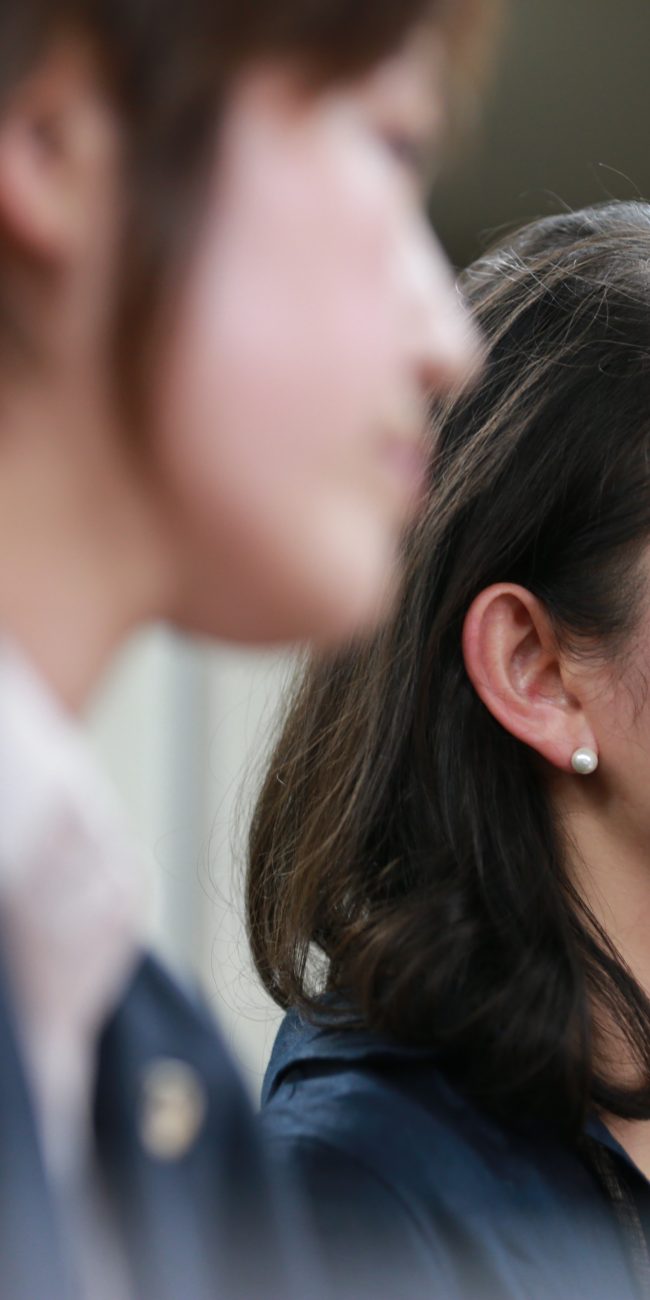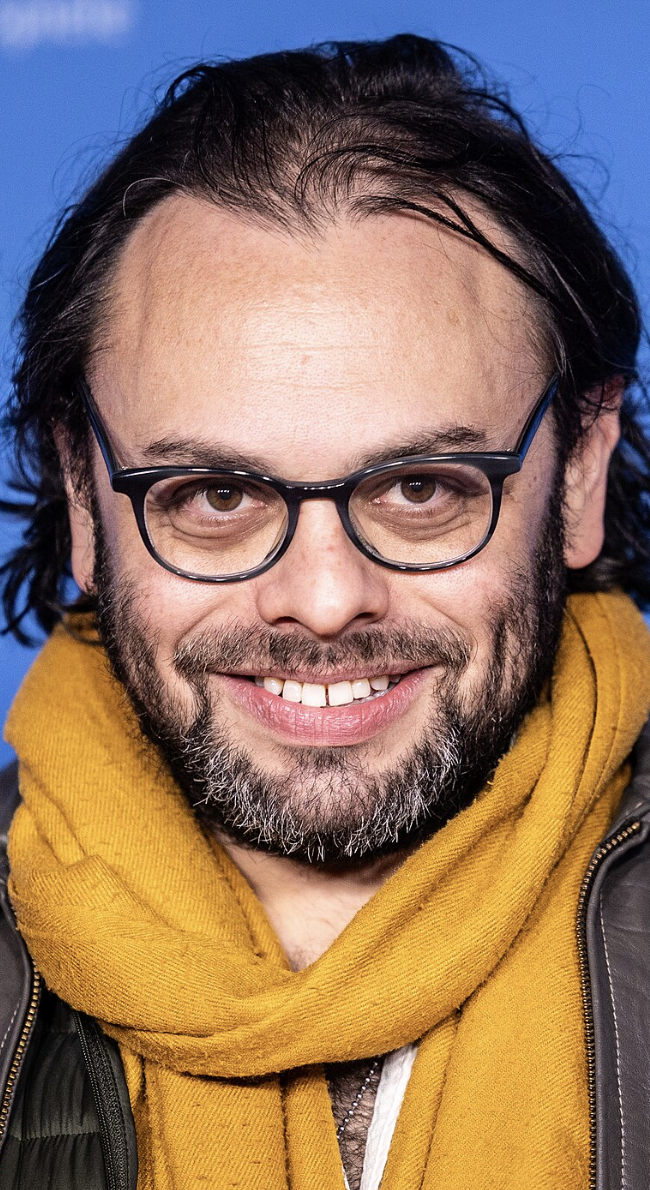I caught up with Dave Boyle, the writer and director of the terrific new comedy White on Rice, via telephone last week. Boyle is in the midst of a months-long festival tour for WOR; the movie screens in New York on Friday as part of the Asian American International Film Festival. Go here to buy tickets for the AAIFF screening, and here to find out more about the film, including future festival showings as well as its upcoming theatrical run. Michael Tully’s H2N review is here.
White on Rice tells the story of Jimmy (Hiroshi Watanabe from Letters From Iwo Jima), a 40-year-old Japanese divorcé living with his sister and her family in Salt Lake City. Jimmy is a man-child, a dreamer, and a fool, whose lovesick pursuit of grad student Ramona (Lynn Chen), his cousin by marriage, drives the plot. The movie’s pacing is remarkably fluent, and the gentle warmth it extends toward all its characters is as affecting as it is infectious. White on Rice is only Boyle’s second feature—his first, 2006’s Big Dreams Little Tokyo, came out last year on DVD—but his talent as a comedic storyteller is already in full flower.
H2N: Tell me a little about your background as a filmmaker.
DB: I think most people dabble [in filmmaking] in middle school in the same way—taking your camera up onto the roof, making action movies with your friends—and I did all that stuff too. Then in high school, I wanted to be an animator. I took animation classes and made animation films on Super 8. Then I decided I wanted to be a filmmaker in the live-action sense. [Starting] at 19, I spent two years doing Mormon missionary work in Sydney, Australia, where I ended up serving in a Japanese community.
H2N: A community of Japanese Mormons?
DB: No, mostly Japanese surf bums. Who had a lot of time on their hands to hang out and speak Japanese with us. And a handful of Japanese Mormons. That’s when I learned the language.
H2N: So that’s how you became an Asian American filmmaker! (laughs)
DB: It’s weird. I was always interested in language and culture—I think if I’d been sent to Mexico for my missionary work, I would’ve made Spanish-language films! After I made my first feature, Big Dreams Little Tokyo, I didn’t think I’d continue along the same lines. But like a lot of filmmakers, I thrive on familiarity, and I wanted to work with the same people again. It just kind of ended up this way, no grand plan to it!
H2N: White on Rice has been doing great at the Asian American film festivals. But I wonder if you’ve had to deal with any PC types questioning your “right” to tell Asian American stories?
DB: Not to my face. (laughs) When CAAM [Center for Asian American Media] first approached me about playing the film as one of their opening night dealios at SFIAAFF this year, I was really grateful. It’s been a non-issue. Audience members at the festivals are obviously curious, but not in a bad way. I think that most people who see the movie recognize that it is really a universal story that just happens to star some Japanese and Asian American actors. It’s sort-of colorblind casting.
H2N: I read somewhere that in your first draft of the screenplay, the main character wasn’t Japanese.
DB: That’s right. But after I met Hiroshi, who plays the lead—he has a small part in Big Dreams—I thought he could easily carry a whole movie on his shoulders.
H2N: Are you interested in exploring religion in your films?
DB: I’d like to. It’s not very well-known outside Utah, but there’s been almost a renaissance of Mormon filmmaking, or at least a lot of Mormon-themed movies, in the last ten years or so. The problem is, there have been so many that the market has gotten saturated. And many of them have been too didactic or self-conscious. Or unambitious—a lot of the “Mollywood” movies, as they’re called, are on the same level of ambition as the Police Academy movies. But I do want to explore the subject someday.
H2N: Just this week I came across an interview with Richard Dutcher. I’d never heard his name before, but he sounds like an interesting filmmaker. Have you seen his work?
DB: Oh, he’s a household name in the Mormon community. He really kicked off the whole movement—quality-wise, he’s probably at the top of the heap. He’s ambitious in his themes. Yeah, I think he’s an interesting filmmaker.
H2N: So how did White On Rice come together?
DB: When I took Big Dreams Little Tokyo on the festival circuit and it started to get some attention, I felt a need to make something else right away before the excitement vanished. So within six months of the premiere of Big Dreams we were in production on White On Rice. In some ways I was working on both at once. I probably wouldn’t want to do it that way again—I might have given Big Dreams a little short shrift by moving on to the next project too soon. Filmmakers are now more a part of the distribution process than ever before, and that is a huge undertaking in and of itself. But I’m glad I got to make both, and it seems like Big Dreams is finding an audience on DVD.
H2N: You wrote and directed Big Dreams yourself, but on White on Rice you had a co-writer, Joel Clark…
DB: [WOR producer and H2N contributor] Mike Lerman introduced me to Joel. Joel was in a comedy troupe at Bard called Olde English. We hit it off right away but only met once before we started working on the script. I already had a couple of drafts done, but he did a lot to help polish the dialogue and tighten things up via email. It’s strange to be working with someone you don’t know personally—we never saw each other again until he came down for the Newport Film Festival screening. He’s a terrific writer, and his sense of humor is so distinctive. It’s funny, people who know us both say they can tell which are the “Dave lines” and which are the “Joel lines.” The guy is definitely going places. I’d like to direct an all-Joel script at some point.
H2N: Speaking of distinctive, one of the things I love about the movie is that Jimmy, the main character, is such an oddball. The way he says whatever’s on his mind, with no impulse control—I guess it’s all part of how the character is still like a kid in so many ways.
DB: One of my favorite movies is What About Bob? A lot of people hate that movie, but I love the Bill Murray character, he’s so obnoxious. There’s something about people like that, who can’t see how weird they are. Jimmy has all these different characteristics—his obsession with dinosaurs, his cheerfulness even in the face of destitution. He’s sort of cobbled together from different people I know. But it’s Hiroshi’s performance that really ties it all together and makes the character work.
H2N: I wondered what interested you, a guy still his 20s, about telling the story of a 40-year-old.
DB: He was originally younger, still divorced but in his 20s on the cusp of 30. I first wrote it before making Big Dreams, with the idea that maybe I would play the character. After making Big Dreams I decided I wanted to stay behind the camera. And by then I’d met Hiroshi. Besides, there are so many movies about people in their 20s or 30s, I wanted to do something different.
H2N: You maintain this very assured comedic tone, but you actually get into some disturbing stuff, like Jimmy’s borderline stalker behavior, and his loneliness. But it’s all done with a light touch.
DB: Some people can get away with more than others can. Hiroshi is a good example. If an actor less charming and skilled had played him, you wouldn’t want to root for him.
H2N: Jimmy’s one of those people I had a great time spending 90 minutes with in a movie but wouldn’t be able to stand in real life for very long.
DB: Joel and I did want to push that, to see how far we could go with his behavior.
H2N: Let’s talk about visual style. In Big Dreams Little Tokyo, you go for a more expressionist look, almost, with the lenses and lighting effects. White on Rice is more classical in its simplicity—the storytelling is invisible, you never feel the director’s hand. Was that a conscious evolution?
DB: In Big Dreams, like a lot of first films, there’s the tendency to throw in everything you’ve ever wanted to try in a movie. I think I grew up a little with White on Rice. I sat through so many screenings of Big Dreams and I noticed that the biggest laughs, the scenes that got the biggest responses, were the simplest. I have a really close collaboration with my DP, Bill Otto [who shot both movies]. On Big Dreams, I would storyboard the entire scene, planning out every shot. With White on Rice, we shot from the hip a lot more. We didn’t storyboard. We’d watch the rehearsal and see what the actors did and figure out where to put the camera from there. It was just about letting the characters tell the story by themselves. Some of my favorite directors are the ones who find the simplest ways to get a scene across.
H2N: Like who? Any in particular you had in mind while working on WOR?
DB: Many of the directors I really admire are the guys who are considered “craftsmen” and aren’t as respected as “artists,” even though they are. Like W.S. Van Dyke, who did the Thin Man comedies. I’ve been watching a lot of TV lately, like Showtime and HBO, and I really admire the direction in some of those shows. You’ve got to hand it to guys like Steve Shill—he did episodes of Dexter and The Tudors and then went on to direct Obsessed, which is a minor classic in its own right!
Recent movies I love include Zodiac and The Squid and the Whale. Since we were shooting Super 16 and doing an optical blowup to 35mm on White on Rice, we studied Squid during prep.
H2N: What are you working on next?
DB: I’m writing a script called Space Cadet, a comedy about racism in my middle school. And I’m interested in some literary adaptations—I’m looking into getting the rights to a couple of books. So after the White on Rice distribution dies down a little, I’ll get back to work on those.
H2N: You obviously have a gift for comedy. Will you continue in this direction?
DB: I’ve always wanted to follow the Woody Allen career plan—make funny stuff and gradually get more serious as my chops get better. I’d like to keep directing stuff so I can make that happen.
H2N: I think comedy tends not to get the respect it deserves—the Oscars being maybe the most obviously egregious example of this. Do you agree? Does this bother you?
DB: Comedy doesn’t tend to get showered with awards or universal praise, but it doesn’t bother me. When it comes down to it, comedy is just so subjective that it’s almost impossible for a huge group of people to come to a consensus on it. Even the most critically acclaimed and commercially successful comedies have droves of passionate detractors.
— Nelson Kim












Pingback: Hammer to Nail » Blog Archive » VIDEO ON DEMAND – June 2010